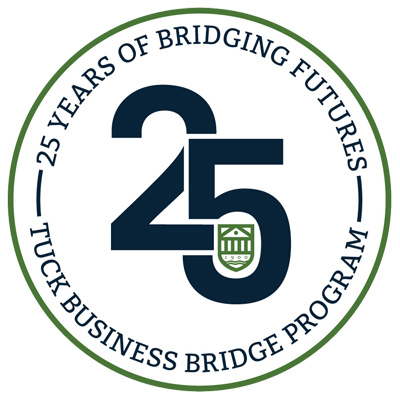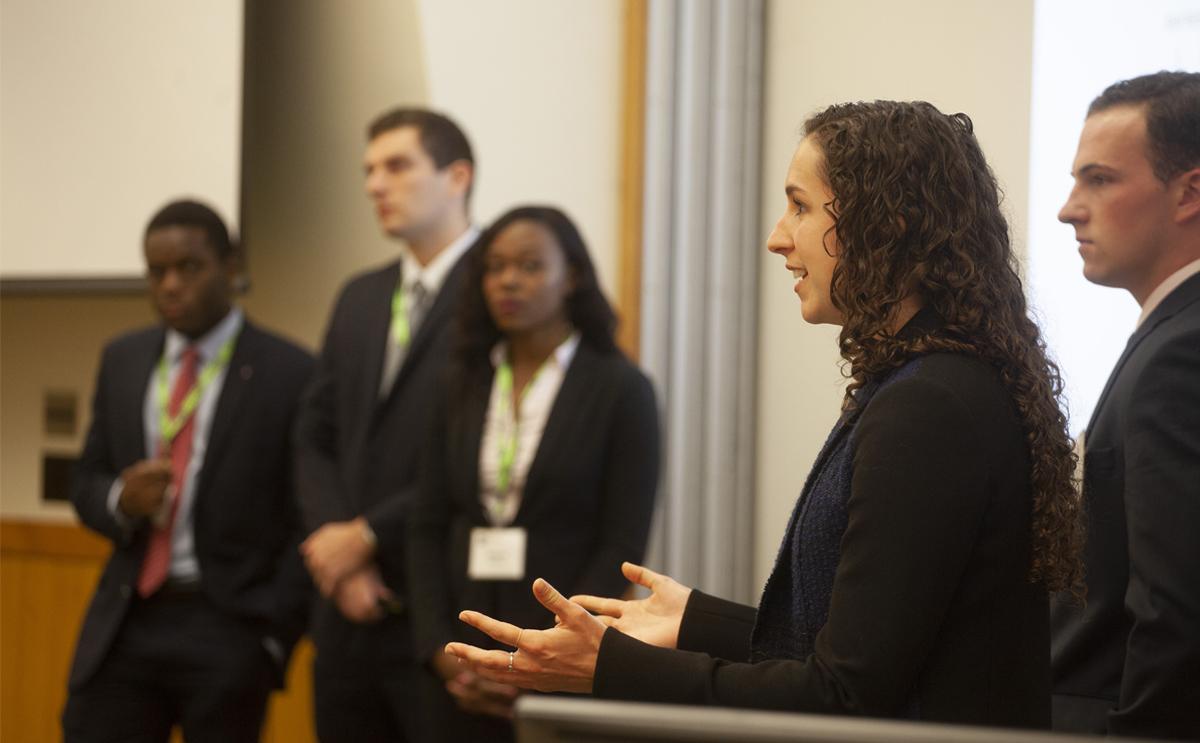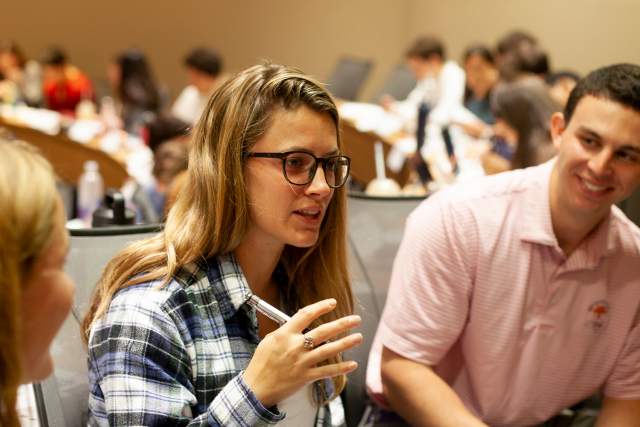
Celebrating its 25th anniversary this year, the Tuck Business Bridge program has continued to grow, innovate, and, when necessary, pivot, to deliver a transformative business education for liberal arts students and recent graduates.
True to its name, the program has created an effective bridge to career and educational opportunities for more than 7,000 alumni and counting. Many have leveraged the knowledge, skills, and confidence they gained during Bridge to pursue careers in finance, consulting, or marketing. Others have become entrepreneurs or grown a family business. Some have returned to Tuck as MBA students.
The legacy of this pioneering program, launched in 1997 by former Dean Paul Danos, has been fueled by a growing number of generous supporters whose giving has helped make Bridge accessible to even more students.
“Support for scholarships is having a measurable impact on our ability to attract and enroll top students,” says Lisa Tedeschi, executive director of Bridge. “This includes increased participation from first-generation students, underrepresented minorities, and students from low-income households.”
Tedeschi says continuing to increase scholarship funding is a key priority and alumni are encouraged to make a gift to support Bridge during this milestone year. In addition to scholarships, alumni gifts will provide funding for faculty development as well as program support provided by the Bridge Associates—a cohort of Tuck MBA students who advise, coach, and mentor Bridge participants.

Many students leverage their Bridge experience to pursue rewarding careers in fields like finance, consulting, or marketing. Some have also returned to Tuck to pursue their MBA. | Photo by Laura DeCapua
The fundraising campaign will officially launch in February, but alumni can make a gift any time by visiting the Bridge Giving page. To commemorate the 25th anniversary, virtual programs offered by Tuck Alumni Lifelong Learning (TALL), traditionally open to Tuck MBA alumni, will now be open to Bridge alumni as well. Upcoming events will also feature the voices and perspectives of Bridge alumni and faculty who teach in the program.
Support for scholarships is having a measurable impact on our ability to attract and enroll top students. This includes increased participation from first-generation students, underrepresented minorities, and students from low-income households.
Lisa Tedeschi, Executive Director, Bridge
“By making these virtual programs available to both Bridge and Tuck alumni, it’s another way we hope to continue building an even stronger and more unified Tuck network,” says Tedeschi.
Another way Bridge has expanded its access in recent years is by pivoting to virtual learning and hybrid formats, which eliminates logistical barriers for students from more distant schools, says Bridge Faculty Director Leslie Robinson. Moving forward, Robinson says the plan is for the first winter Bridge session and two summer sessions to return to in-person with a virtual session in January.
“Offering Bridge virtually has allowed us to enroll students we have never been able to attract because of the logistical challenges of getting them to Hanover,” shares Robinson, adding that virtual learning also provided faculty with an opportunity to experiment with their teaching.
“Through the expanded use of tools like recorded videos, Zoom breakout rooms, and polls, faculty were compelled to think creatively about their pedagogy,” she says. “Now we are asking ourselves how to incorporate what worked well in the virtual environment as we transition back to in-person teaching.”
The rigor and relevance of the Bridge curriculum continues to be one of the program’s hallmarks. Faculty meet multiple times throughout the year to discuss the sequence of courses—Business Communications, Corporate Finance, Marketing, and Organizational Behavior, to name a few—as well as how to introduce and integrate key topics.

The Bridge program includes a rigorous curriculum, team capstone project, and a variety of opportunities to connect with alumni and recruiters. | Photo by Laura DeCapua
Robinson says this close coordination among faculty is especially critical since most Bridge students lack any prior exposure to business and are expected to learn concepts quickly during an intensive, three-week “crash course.” This learning culminates with Bridge’s signature capstone project, which invites students to apply what they have learned by evaluating and properly valuing an existing company.
Alongside several Tuck colleagues, Norman W. Martin 1925 Professor of Business Administration Robert Hansen was instrumental in developing the capstone project, which began with groups of students working with local companies on a short-term consulting project but has since evolved into an in-depth company valuation drawing on concepts learned throughout the curriculum.
“The project ties all aspects of the Bridge program together,” says Hansen. “Valuing a company requires understanding accounting, finance, economics, spreadsheet modeling, marketing, strategy. On top of that, you are working within a team and presenting what you learned.”
Like the capstone project, career development remains a fixture of the Bridge experience. Historically, this largely centered around a one-day Career Fair that brought employers and alumni to campus for mock interviews, recruiting, and panel discussions.
Tasked with replicating these activities virtually during the pandemic, Robinson says Bridge now has a growing collection of on-demand recordings that can be accessed any time. Students can also sign-up online to connect virtually with alumni and recruiters for mock interviews and networking. In addition to the one-day event, Robinson says students now have access to an exploratory environment of online material they can move through at their own pace.
When they connect with a potential employer, either in person or virtually, Hansen knows every Bridge student will have something valuable to talk about. “They can easily talk for an hour in an interview about their capstone project,” says Hansen. “They can discuss the company, its strategy and financial performance, and conclude with a discussion of the company’s valuation and key drivers of that value. I have had many interviewers tell me how impressed they are with Bridge graduates.”
Support Tuck Bridge
Thanks to generous support, Tuck Bridge provides financial aid packages, world-class teaching, and innovative programming that helps our students develop the skills and the confidence to transform our world.

